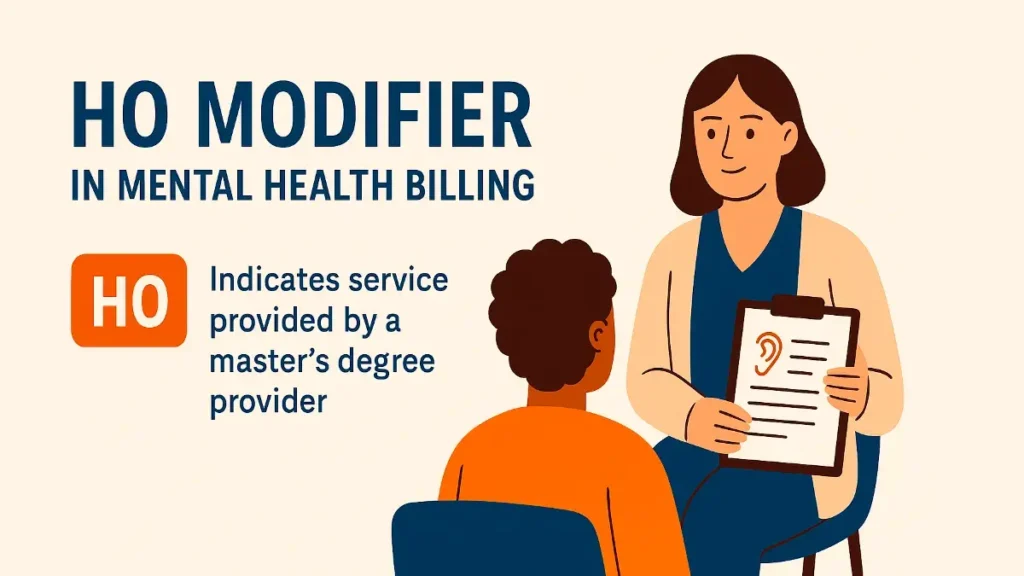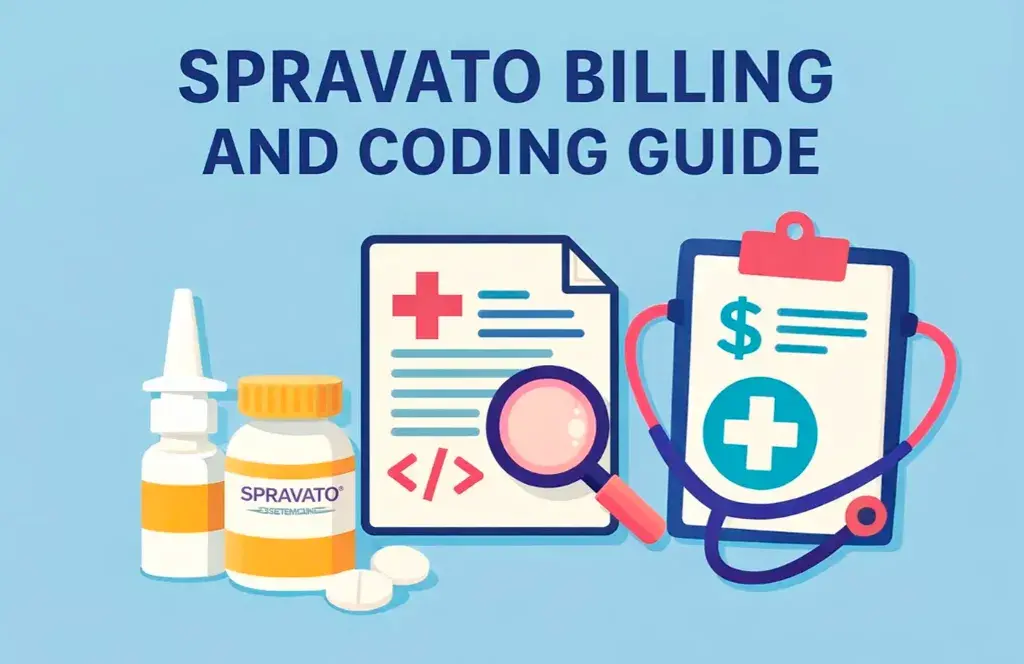Table of Contents
ToggleWhat Is the HO Modifier in Mental Health Billing?
The HO modifier is used in behavioral health billing to indicate that the service or procedure performed was provided by a professional with a master’s degree in a relevant field such as psychology, counseling, or social work. It helps payers identify the level of the provider’s qualifications and supports appropriate reimbursement. According to CMS guidelines, mental health modifiers like HO are essential for ensuring accurate reimbursement and must reflect the provider’s credentials in behavioral health billing. HO is a level-of-care modifier used with CPT or HCPCS codes to provide additional information about the services rendered.
Why the HO Modifier Matters in Behavioral Health Billing
In behavioral health, reimbursement often depends not only on what service was delivered but also on who delivered it. The HO modifier tells insurance payers that the provider holds a master’s-level degree, distinguishing them from bachelor’s- or doctoral-level professionals. This clarity ensures that services are correctly processed, priced, and documented. It also supports compliance with medical billing regulations and follows coding guidelines that encourage accurate documentation.
Understanding and correctly applying modifiers ensures accuracy and appropriate reimbursement, especially in mental health billing. The HO modifier is just one of many modifiers for mental health that play a vital role in health billing and billing and coding practices. For a deeper understanding of how modifiers impact mental health reimbursement, see our complete guide to GY, GA, and GZ modifiers.
Common Situations Where HO Is Used
The HO modifier plays a crucial role in mental health billing, especially when documenting services provided by professionals with a master’s degree. Below are typical scenarios where using this modifier is necessary for accurate claims and proper reimbursement.
- Individual or group therapy sessions provided by a licensed professional counselor (LPC) or licensed marriage and family therapist (LMFT)
- Services offered by a master’s-level social worker (LMSW) in outpatient mental health settings
- Behavioral health services where payers require proof of provider qualifications, such as Medicaid and private insurance plans
- Psychotherapy services for a patient that are part of an ongoing treatment management plan
The use of modifiers like HO, HN, and HP ensures claim accuracy and helps prevent claim denials. They also clarify the complexity of the services provided and the qualifications of the licensed mental health professional performing them. Nurse practitioners involved in mental health treatment may also need to use appropriate modifiers depending on payer requirements.
HO Modifier vs. Other Common Modifiers for Mental Health Billing
In behavioral health billing, various modifiers are used to reflect the provider’s educational background and professional qualifications. The table below outlines common mental health modifiers and their corresponding degree levels to help ensure accurate coding and billing.
| Modifier | Meaning | Degree Level |
|---|---|---|
| HN | Bachelor’s degree provider | BA/BS |
| HO | Master’s degree provider | MA/MS/MSW |
| HP | Doctoral degree provider | PhD/PsyD |
| AJ | Clinical social worker | Varies (often MA) |
| AH | Clinical psychologist | PsyD or PhD |
| AF | Psychiatrist | MD |
Each of these mental health modifiers provides valuable details that enhance coding accuracy and ensure appropriate billing. Proper modifier usage helps avoid errors and ensures accurate processing of claims.
Best Practices for Using the HO Modifier
Correct use of the HO modifier helps ensure clean claims, supports compliance, and minimizes delays in reimbursement. Below are practical tips to follow when applying this modifier in behavioral health billing.
- Append HO to the CPT code or service code when the procedure is performed by a master’s-level mental health professional
- Ensure that documentation clearly supports the use of this specific modifier
- Check payer guidelines, especially Medicaid, which often requires this level of specificity for reimbursement
- Stay updated on insurance and healthcare policy changes to reduce billing errors and improve reimbursement accuracy
- Always include details about the services they provide, along with the qualifications of the provider, to support modifier application
The modifier HO should not be confused with other telehealth modifiers like 95 or GT, which are used to indicate synchronous telehealth services. If the therapy session is delivered remotely via audio and video, and by a master’s-level provider, both modifiers may apply. Accurate documentation ensures the patient receives the correct care and the provider is appropriately reimbursed for the services.
How Modifier Usage Affects Claims, Coding, and Reimbursement
Modifiers play a key role in behavioral health billing. They:
- Ensure accurate claims and appropriate reimbursement for services provided
- Help indicate provider level, procedure details, and service complexity
- Reduce the risk of claim denials and improve the clarity of the health coding process
- Support the use of separately identifiable evaluation and management services by the same physician on the same day of the procedure or other service
- Reflect the medical necessity of care and contribute to ensuring accurate reimbursement
Using modifiers correctly is essential for healthcare professionals aiming to stay in compliance and qualify for Medicaid or insurance payments.
Final Notes on Behavioral Health Modifiers and CPT Code Usage
Using the HO modifier properly is a small but critical part of behavioral health billing. It communicates provider qualifications, supports clean claims, and reduces back-and-forth with payers. Stay updated on your state’s and payers’ specific modifier rules to avoid billing issues and improve accuracy.
Modifier usage, especially for mental health billing, helps ensure services are properly coded and reimbursed. Understanding how to apply HO, along with related modifiers like HN, HP, AH, AJ, and AF, ensures coding compliance and minimizes delays. Appropriate modifiers serve to represent the complexity of the care rendered.
Need expert help with behavioral health billing? Contact Swift Medical Billing – we help mental health providers get reimbursed accurately and stay compliant while navigating the complexity of medical billing and health services coding. Our experts are here to help you review your processes, update documentation, and improve billing practices.




